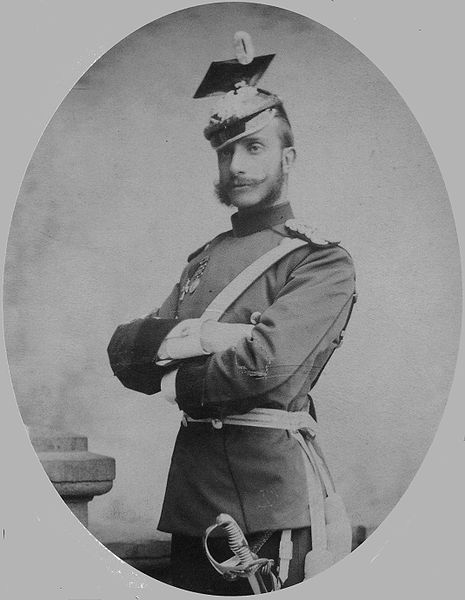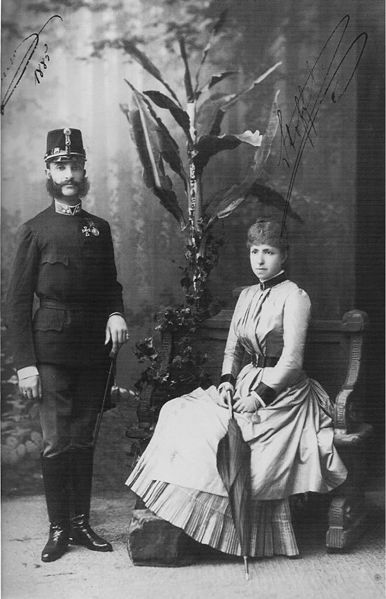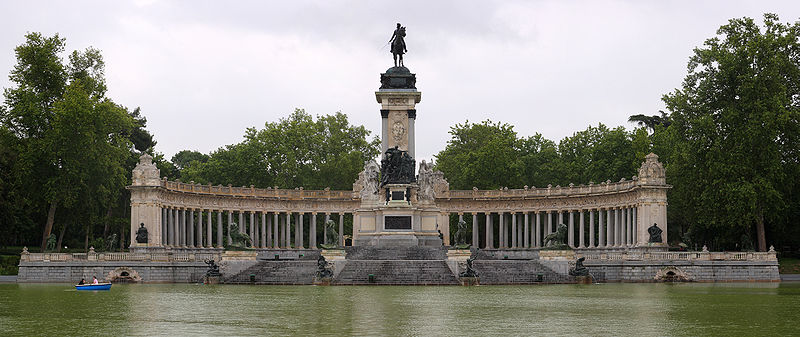<Back to Index>
- Meteorologist Luke Howard, 1772
- Poet and Painter William Blake, 1757
- King of Spain Alfonso XII, 1857
PAGE SPONSOR


Alfonso XII (born Alfonso Francisco de Asís Fernando Pío Juan María de la Concepción Gregorio Pelayo) (Madrid, 28 November 1857 – El Pardo, 25 November 1885) was king of Spain, reigning from 1875 to 1885, after a coup d'état restored the monarchy and ended the ephemeral First Spanish Republic.
Alfonso was the son of Isabella II of Spain, and allegedly, Francisco de Asís de Borbón,
her King Consort. His true biological paternity is uncertain, though
his legal paternity is not: his mother was married to her (presumed homosexual) cousin Francisco de Asís de Borbón, the King Consort of Spain, at the time of Alfonso's conception and birth. When Queen Isabella and her husband were forced to leave Spain by the Revolution of 1868, Alfonso accompanied them to Paris. From there, he was sent to the Theresianum at Vienna to
continue his studies. On 25 June 1870, he was recalled to Paris, where
his mother abdicated in his favour, in the presence of a number of
Spanish nobles who had tied their fortunes to that of the exiled queen.
He assumed the title of Alfonso XII, for although no King of united
Spain had borne the name "Alfonso XI", the Spanish monarchy was
regarded as continuous with the more ancient monarchy represented by
the eleven kings of the Kingdom of Asturias, León and Castile, also named Alfonso. Shortly afterwards, Alfonso proceeded to the Royal Military Academy Sandhurst in the United Kingdom in
order to continue his military studies. While there, he issued, on 1
December 1874, in reply to a birthday greeting from his followers, a
manifesto proclaiming himself the sole representative of the Spanish
monarchy. At the end of that year, when Marshal Serrano left Madrid to take command of the northern army in the Carlist War, Brigadier Martínez Campos, who had long been working more or less openly for the king, led some battalions of the central army to Sagunto, rallied to his own flag the troops sent against him, and entered Valencia in
the king's name. Thereupon the president of the council resigned, and
his power was transferred to the king's plenipotentiary and adviser, Antonio Cánovas. Within
a few days after Canovas del Castillo took power, the new king,
proclaimed on 29 December 1874, arrived at Madrid, passing through Barcelona and Valencia and was acclaimed everywhere (1875). In 1876, a vigorous campaign against the Carlists, in which the young king took part, resulted in the defeat of Don Carlos and the Duke's abandonment of the struggle. On 23 January 1878 at the Basilica of Atocha in Madrid, Alfonso married his cousin, Princess Maria de las Mercedes, daughter of Antoine, Duke of Montpensier, but she died within six months of the marriage. Towards the end of the same year, a young workman of Tarragona, Juan Oliva Moncasi, fired at the king in Madrid. On 29 November 1879 at the Basilica of Atocha in Madrid, Alfonso married a much more distant relative, Maria Christina of Austria, daughter of Archduke Karl Ferdinand of Austria and of his wife Archduchess Elisabeth of Austria.
During the honeymoon, a pastry cook named Otero fired at the young
sovereign and his wife as they were driving in Madrid. The children of
this marriage were: In
1881, the King refused to sanction a law by which the ministers were to
remain in office for a fixed term of eighteen months. Upon the consequent resignation of Canovas del Castillo, he summoned Práxedes Mateo Sagasta, the Liberal leader, to form a new cabinet. In November 1885, Alfonso died, just short of his 28th birthday, of tuberculosis. Coming
to the throne at such an early age, Alfonso had served no
apprenticeship in the art of ruling, but he possessed great natural
tact and a sound judgment ripened by the trials of exile. Benevolent
and sympathetic in disposition, he won the affection of his people by fearlessly visiting districts ravaged by cholera or devastated by earthquake in
1885. His capacity for dealing with men was considerable, and he never
allowed himself to become the instrument of any particular party.
During his short reign, peace was established both at home and abroad,
finances were well regulated, and the various administrative services
were placed on a basis that afterwards enabled Spain to pass through
the disastrous war with the United States without the threat of a revolution. He was the 996th Knight of the Order of the Golden Fleece in Spain, the 104th Grand Cross of the Order of the Tower and Sword in 1861 and the 775th Knight of the Order of the Garter in 1881. He had two sons by Elena Sánz y Martínez de Arrizala (Castellón de la Plana,
15 December 1849 - Paris, 24 December 1898), who also had another son
by an unknown father other than the King named Jorje Sánz y
Martínez de Arrizala.
